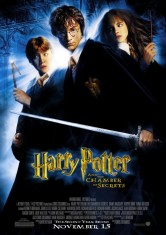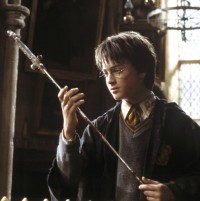|
Harry Potter and the Chamber of Secrets
|
| |
 |
USA, 2002. Rated PG. 161 minutes.
Cast:
Daniel Radcliffe, Emma Watson, Rupert Grint, Richard Harris, Maggie Smith,
Kenneth Branagh, Robbie Coltrane, Alan Rickman, Shirley Henderson, Miriam
Margolyes, Tom Felton, Jason Issacs, Julie Waters, Mark Williams
Writers: Steve Kloves, based on the novel by J.K. Rowling
Music: John Williams, adapted and conducted by William Ross
Cinematographer: Roger Pratt
Producers: David Heyman, Tanya Seghatchain
Director: Chris Columbus
LINKS
|
 or
the past few months there's been hype surrounding the growing maturity of the
Harry Potter franchise--the script material was getting darker, the movies
were getting edgier, the audience was growing older, and the child stars were
growing with them. Do believe the hype: The stars are aging rapidly (star
Daniel Radcliffe's voice has gone from Billy Gillman to Barry White in just
one year), and the material is getting darker (if you think spiders and
snakes are creepy, try the soul-sucking Dementors of Harry Potter and the
Prisoner of Azkaban and death and dismemberment in just one scene of Harry
Potter and the Goblet of Fire). If the filmmakers continue to stay faithful
to the books, the ratings of future Harry Potter movies is a very pressing
issue.
or
the past few months there's been hype surrounding the growing maturity of the
Harry Potter franchise--the script material was getting darker, the movies
were getting edgier, the audience was growing older, and the child stars were
growing with them. Do believe the hype: The stars are aging rapidly (star
Daniel Radcliffe's voice has gone from Billy Gillman to Barry White in just
one year), and the material is getting darker (if you think spiders and
snakes are creepy, try the soul-sucking Dementors of Harry Potter and the
Prisoner of Azkaban and death and dismemberment in just one scene of Harry
Potter and the Goblet of Fire). If the filmmakers continue to stay faithful
to the books, the ratings of future Harry Potter movies is a very pressing
issue.
Already there was concern that Harry Potter and the Chamber of Secrets,
the second in the book and movie franchise, would be rated PG-13 instead of
PG because of its subject matter. Anyone who read the books wouldn't doubt such
worry was legitimate - Chamber of Secrets includes many pleasant things like
prejudice, genocide, blood-written messages, giant spiders, giant snakes, and
a violent Bludger during a rough game of Quidditch. The question of whether
small children could handle such heavy material was justified. Reading the text
and forming foggy images in one's brain isn't nearly the same as seeing fully
realized visuals on the realistic silver screen.
The story takes place during Harry Potter's (Radcliffe) second year at Hogwarts,
after what could possibly have been the worst summer he's ever spent with his
dreadful relatives, the Dursleys. Preceding the heavy house arrest placed on
Harry, a house-elf named Dobby (voiced by Toby Jones) warns the young wizard
that Hogwarts will no longer be safe for him this year. Harry, ignoring Dobby's
warnings, bulldozes his way back to Hogwarts with determination after his best
friend, Ron Weasley (Rupert Grint) "rescues" him via a turquoise flying Ford
Anglia.
Initially the only danger at Hogwarts appears to be Harry's loopy new teacher,
Gilderoy Lockhart (Kenneth Branagh), a best-selling author and wizard personality.
However, not even the screw-ups performed regularly by Lockhart can compare
to the eerie things that start to happen. Harry starts to hear an icy, disembodied
voice through the Hogwarts corridors, and several Hogwarts students begin to
turn up "petrified." Rumors surface about a "Chamber of Secrets" hidden somewhere
in Hogwarts, created by Salazar Slytherin, the unfriendliest of the school's
four founders.  The
culprit behind the attacks is thought to be the Heir of Slytherin, the only
one who can open the Chamber and control the rumored monster within. Harry quickly
becomes the prime suspect.
The
culprit behind the attacks is thought to be the Heir of Slytherin, the only
one who can open the Chamber and control the rumored monster within. Harry quickly
becomes the prime suspect.
One of the more fascinating aspects of Harry Potter and the Chamber of Secrets
is how author J.K. Rowling draws a parallel between Harry Potter and Tom Marvolo
Riddle (Christian Coulson), a mysterious character who attended Hogwarts fifty
years before Chamber of Secrets takes place. They are foils, both similar
and different at the same time. Rowling also does a great job in writing the
alienation, distrust, and suspicion of Harry Potter as the school begins to
think that he is the Heir of Slytherin. The reasons behind Harry's alienation
help build his character and force the reader to question Harry as much as he
questions himself. Kloves has failed to repeat this effect in the movie, instead
opting to create a crowd-pleaser which only focuses on the surface of Chamber
of Secrets instead of the substance. Any possible development in character,
plot, and theme is sacrificed. Tom Riddle, for example, becomes a mere two dimensional
character, rather than the complex entity he was in the book because his background
story is written out. The only good thing about the script is its humor.
Unlike the first movie, however, it's even harder still to rip Kloves and Columbus
to shreds because, mangled as their Chamber of Secrets may be, it's still
highly entertaining and clearly addresses some of the problems of the first
film. The performance of lead Daniel Radcliffe is an excellent example of how
much things have improved from Harry Potter and
the Sorcerer's Stone. I can attest to his growth as an actor after having
one of my many viewings of Chamber of Secrets in front of a packed house
on opening night, where the mostly adult crowd responded warmly to him. Radcliffe
just oozes charisma, is perfect as Harry, and can hold his own against talented
actors like Coulson (whose performance as Riddle was possibly the best in the
film). Compare this to Sorcerer's Stone, where Radcliffe was being upstaged
by everyone and everything on the same frame.
The visual liberties Columbus has taken with this film works to his benefit,
more so than the stiff point-and-shoot method in Sorcerer's Stone. Even
better, the visuals highlight what this production got right with the
book series. Things may not be exactly as they're described in the books, but
they never ring false. The opening shot alone demonstrates just how bad it is
to live with the Dursleys. However, Columbus can get overzealous with the camera,
especially during one needlessly surrealistic flashback scene.
The returning adult cast members are given scarcely anything to work with.
Chris Columbus was right, this movie did need more Alan Rickman, though
his Snape loses some of the allure that made his performance so appealing last
year. The only adult actors whose performances haven't diminished are Dame Maggie
Smith as Professor McGonagall, Robbie Coltrain as Hagrid, and the late Richard
Harris as Dumbledore. It is the newcomers (Issacs, Branagh, and Coulson) who
steal the show. The only reason why anyone would like Lucius Malfoy and Gilderoy
Lockhart is because Issacs and Branagh play them so well.
As for the young'uns, Radcliffe, Grint, and Emma Watson (who plays the overemphasized
Hermione Granger), all are developing well, though Grint's comic zaniness might
grate on some people's nerves. Tom Felton, who plays Draco Malfoy, disappoints
after a perfectly fine performance in Sorcerer's Stone. Someone please
tell this boy that eyebrow raising is not intimidating.
A surprising improvement in Chamber of Secrets has been John William's
score. He was too busy, apparently, to write a new score for Chamber
of Secrets, thus wrote some new themes and left the rest to William Ross
(who earlier this year wrote the wonderful score to Tuck Everlasting).
The random Herrmannesque moments in the score are a nice touch (because everyone's
feeling very Herrmann-y this year), but even more impressive is the positively
chilling, dark, and brilliant "Chamber of Secrets" theme Williams has developed.
The Harry Potter series is getting better. There are, of course, certain
things the filmmakers need to sort out before Harry Potter can really
contest with movies like Lord of the Rings.
As a piece of entertainment, though, Harry Potter and the Chamber of Secrets
doesn't disappoint. Yes, there's loads out there that's higher in quality than
Harry Potter (like Lord of the Rings); but what makes Harry
Potter so great is its ability to transcend, to be intelligent yet crowd
pleasing at the same time.
Review
© December 2002 by AboutFilm.Com and the author.
Images © 2002 Warner Bros. All Rights Reserved.

 The
culprit behind the attacks is thought to be the Heir of Slytherin, the only
one who can open the Chamber and control the rumored monster within. Harry quickly
becomes the prime suspect.
The
culprit behind the attacks is thought to be the Heir of Slytherin, the only
one who can open the Chamber and control the rumored monster within. Harry quickly
becomes the prime suspect.
